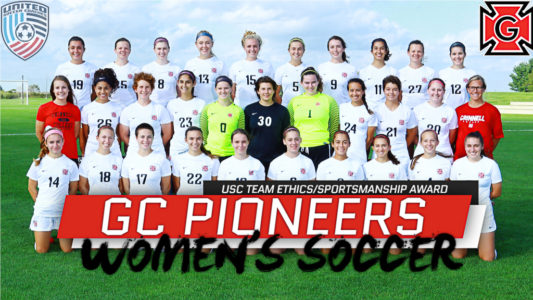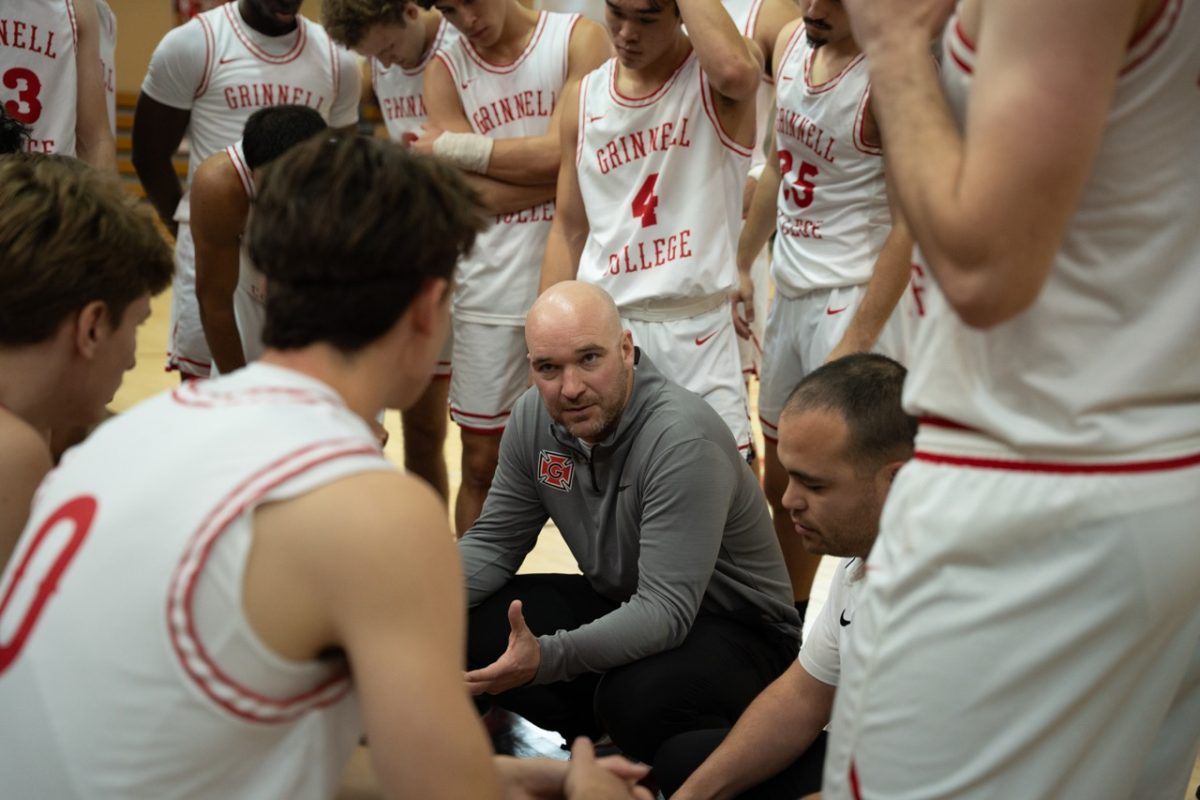
By Zoe Fruchter
fruchter@grinnell.edu
This month, the Grinnell women’s soccer team was awarded the United Soccer Coach’s (USC) Team Award for Ethics and Sportsmanship, conferring national recognition onto the daily work that Grinnell players and coaches alike put into making their program fair, fun and competitive.
USC designates three tiers for the ethics and sportsmanship award based on the percentage of yellow cards received in the regular or post-season matches: 0 percent for platinum, 10 percent or under for gold, 30 percent for silver and 50 percent for bronze. All awarded teams must have received no red cards. The awards are open to men and women’s college soccer programs. Grinnell College women’s soccer was among the eleven teams that won gold for their 2019 season.
Assistant Coach Alexandra Place attributes this success to a holistic team culture that focuses on community building both inside and outside the team, as well as technical development.
“While we do teach them Xs and Os and the tactical things behind it, we also focus on being respectful and why that’s important, and how that respect impacts you for the rest of your life,” said Place. She described how the athletes demonstrate this value of respect through their social inclusivity, community service and team bonding.
Her players agree. “Since we have respect for each other and a love for each other, it makes it easier not to explode, and to show other teams our values,” explained goalkeeper Hannah Malicky ’22.
Soccer differs from sports such as basketball in that a team can have unlimited fouls called on them in a game, as long as those fouls are within the scope of fair play and intent. A yellow card is issued by the referee when a player demonstrates foul play, like tackling a player intentionally instead of targeting the ball, or unsportsmanlike conduct such as talking back to the referee. Red cards are issued, though rarely, in cases of extreme fouls or conduct, or after a player has been awarded two yellow cards.
Therefore, the team’s lack of cards does not indicate any lack of aggressive play, but rather a team which values safe and competitive play.
“Everyone’s here to play because we love playing soccer,” said midfielder Jill Paladino ’23. “There’s a mutual respect that we don’t want to hurt anyone because we are all here to play.”
In order to play at the gold standard of collegiate soccer, the team puts in the work in practice. Both Coach Place and the players described how “playing hard” in practice translates to clean play on the field, especially in a high pressure game environment.
“The difference between clean play and playing dirty, harsh or vicious is just about body position, focusing on using your hips as opposed to stabbing with your feet and tripping,” explained Place.
Malicky noted that when a team plays dirty, it affects the entire atmosphere of the game, from the coaches, to the referee, to the players, preventing them from playing “good soccer.”
Paladino explained that when they play against an unsportsmanlike team, tactics have to be disregarded in favor of making sure that you don’t get injured.
“It messes everything up,” she said. “And it’s not that I’m scared to be tackled, because that’s soccer, it’s that I will break my leg if I have the ball for more than three seconds because this girl is trying to do that.”
Such fear of injury is especially relevant to the recent Grinnell women’s soccer program, which has been plagued with ACL injuries that often bench players for a season or more. Paladino said that this is something the players are “hyperaware” of, and that seeing the effects of such injuries on their teammates both physically and emotionally motivates them to play cleaner and more precisely on the field.
The close-knit nature of the program is evident in the team’s unity even amidst injuries. Ella Henneger ’23, a first-year midfielder, injured her ACL before she came to Grinnell yet said that she felt more accepted in this team than in her high school team, traveling with them when possible and providing support from the bench at games.
Coach Place confirmed that the tight community not only of Grinnell College soccer but also of Grinnell College contributes to the ethics and sportsmanship of the team. Many of the awarded programs, and all of those in the gold tier, were from schools with an enrollment of under 3,000 students. Place said that this correlation is no accident. Smaller schools allow for strong relationships between the players and their fellow athletes, and between the players and their coaches. She added the norms of respect enabled by a smaller program are established not only in the athletic department, but also in team members’ relationships with professors and other students at Grinnell.
To those familiar with Grinnell College women’s soccer, the gold designation confirms what they already know to be true about their team. On a recent recruiting trip to Orlando, Fla., Place described meeting one of the recruits’ fathers, who thanked Place for coming to watch his daughter play and commented on how he knew the Grinnell women’s soccer program for its close community and the way their athletes treat each other, officials and opposing teams.
“We got this award and it wasn’t a surprise, but we didn’t do anything different to get this award,” said Place. “[The award] is due to the great people we have on this team and the relationship we have between the coaches and the players.”



















































